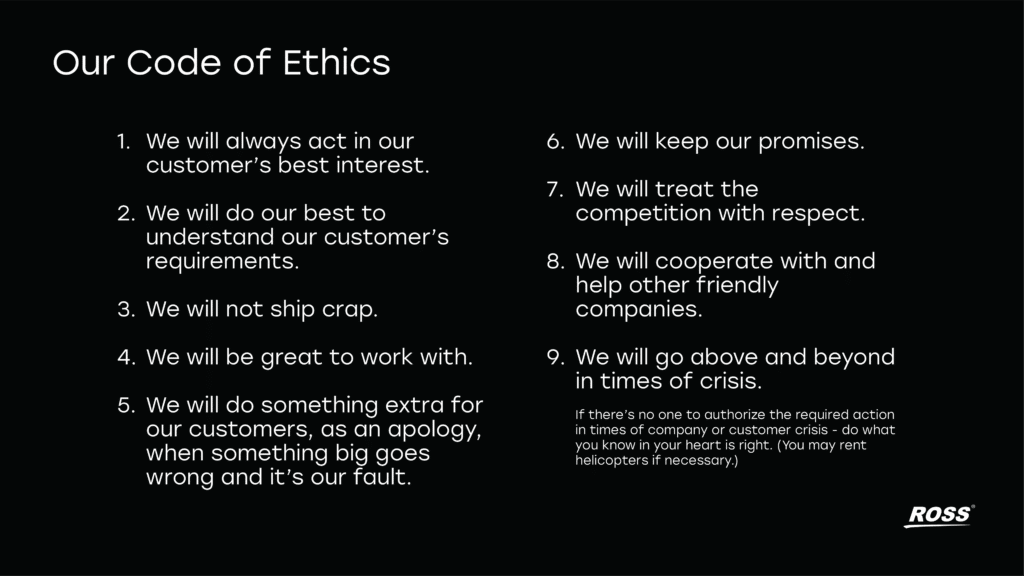June 9, 2025 - Ross Video Team, Insights & Resources
What Sets Great Tech Vendors Apart? Integrity


Trust in technology is a foundational element for broadcasters, particularly on the operational side of the business. While viewer loyalty and advertiser confidence are crucial, these are often driven by content creators and producers.
The role of technology vendors in this context is to ensure the operational integrity of these broadcasts—providing the stable, reliable infrastructure that keeps programming on air without disruption. For broadcast engineers, technical directors, and production teams, a trusted technology partner means fewer sleepless nights and more confidence in the live production environment.
Trust helps to shape audience loyalty, advertiser confidence, and operational stability. It permeates virtually every level of a broadcast company—from the content they create and deliver to their audience to the technology they use to manage their workflows.
For many in the broadcast industry, choosing the right technology partner isn’t just about brand reputation or viewer loyalty, it’s about protecting their own careers and reputations. Engineers, technical directors, and operations managers must rely on a vendor that backs their professional credibility.
If a live production fails due to unreliable technology, it’s often these professionals who bear the responsibility. Downtime, lost productivity, and hampered workflows due to unreliable technology are reputational killers. All three can mean lost advertiser dollars, lost viewership, and lost trust. Broadcasters, therefore, can’t afford to risk working with vendors that overpromise and underdeliver.
Below, we’ll explore the importance of trust and integrity in broadcast technology partnerships, and offer insights into how broadcasters and media production companies can ensure they’re selecting the right partners for their business.

To help understand the impact of vendor trust —or a lack thereof—let’s first look at each side of the equation. Specifically, the key characteristics of a trustworthy and untrustworthy technology vendor.
Any broadcast business would choose the first option—a business that they can trust.
When you do, the benefits are many:
Trusting your technology vendor is a must for any modern broadcast organization. But, as in everyday life, trust isn’t automatic. It’s built over time and driven by a person’s or company’s demonstrated integrity and reliability.
This positively impacts a broadcaster’s ability to plan for the future and be confident in the reliability of its existing services.
It’s also important to remember that the trust equation extends beyond corporate brands to the individuals making critical technology decisions. These professionals are often the first to face scrutiny if a project goes sideways. By partnering with a trustworthy technology vendor, they gain an ally that understands the stakes and can deliver when needed.
As mentioned, trust is built over time and through repeatable actions and values demonstrated by a technology vendor. Here are examples of factors that might help to build or erode trust in a vendor:
Of course, these lists are not exhaustive. Broadcasters will have a series of individual moments, events, and interactions that cumulatively build or erode trust in the vendor. No partner is perfect all the time. What’s important is that the vendor handles each of these business interactions with integrity and transparency.
Vendors that operate with integrity follow through on commitments, provide transparent service agreements, and prioritize customer relationships over short-term profits—all of which stem from high levels of integrity.
Ethical business practices create stability and predictability for customers, ensuring that broadcasters can depend on their technology partners for long-term success. As a result, companies with a strong reputation for integrity attract repeat business, as broadcasters become confident in their ability to consistently deliver on their promises.
Integrity also fuels long-term innovation, both for technology providers and the broadcasters they serve. That’s because companies that prioritize ethical leadership are more likely to reinvest in the stability of their operations and into research and development that drives new industry innovations. Rather than focusing on quick wins, these vendors build solutions that support broadcasters today, tomorrow, and for years to come.
Making the right decision for the future of their own company—and that of their customers—comes from a place of strong integrity and ultimately benefits their employees, clients, and partners.
Selecting the right technology partner, as you likely know, is one of the most critical decisions for broadcasters and media production companies. To make this decision more confidently, vendor integrity should be considered when evaluating potential partners.

Here are five key traits to look for in a vendor that signal a high degree of organizational integrity.
By prioritizing these traits, broadcasters can ensure they’re partnering with a vendor that values trust, integrity, and long-term success just as much as they do.
When evaluating new technology partners, broadcasters and media production companies can follow these steps to help them screen for integrity and trustworthiness.
Before signing a contract, conduct a thorough vetting process by asking direct, critical questions about a vendor’s business practices.
Transparency and ethics:
Customer commitment:
Awards, certifications, and third-party endorsements serve as external validation of a vendor’s credibility and ethical business practices.
Look for:

A vendor’s track record is one of the strongest indicators of its reliability and integrity. Examine case studies and testimonials to see how they’ve handled challenges for other clients.
Pay attention to:
Keep Reading: Ross Video Customer Success Stories
A company’s leadership and internal culture often reflect its approach to customer relationships. Vendors with high turnover in executive positions or a poor workplace reputation may lack stability.
Look out for:

A trustworthy vendor doesn’t just sell a product—it invests in its long-term success. Look for companies that prioritize product evolution while maintaining backward compatibility.
A vendor’s financial health impacts its ability to support clients long-term. Unstable vendors may struggle with resource allocation, customer support, or maintaining key products.
To evaluate this, look at:
Before committing to a vendor, evaluate how they handle customer interactions. A trustworthy partner should be accessible, transparent, and proactive in resolving issues.
Free Trial: Request your trial licence of Carbonite Code, Ross Video’s software-based production switcher
Vendors committed to corporate responsibility often have stronger reputations and more predictable business practices.
Evaluating a vendor’s integrity requires more than examining product specs and pricing—it’s about ensuring they are a stable, ethical, and trustworthy partner who will support your operations for years to come.
By following these steps, broadcasters and media production companies can make informed decisions, avoid costly mistakes, and protect their reputations in a highly competitive industry.
Upgrading your production tech stack is crucial for improving workflows, enhancing content quality, and staying competitive. But how do you ensure a smooth transition without downtime or operational disruptions?
To help, we’ve created a comprehensive guide that explores the challenges of production technology upgrades and offers actionable strategies for achieving continuity throughout the process.

Trust in your broadcast technology partner isn’t a luxury; it’s a financial and operational necessity. When every second on-air impacts a broadcaster’s success—for better or worse—vendor support …

Stability is crucial in live broadcasting and production. It can make or break a company’s reputation, leading to either gains or losses in viewership and trust. Picture …

Broadcast technology is only as reliable as the people behind it. A vendor can promise cutting-edge solutions in their marketing and sales decks, but without deep industry …
Your essential guide to navigating live video production technology upgrades and replacement.